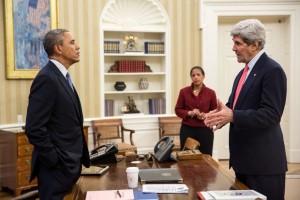Cross-posted from Consortium News
What this has meant is that Obama often has acted at cross-purposes, inclined to cooperate with sometimes adversaries like Russia on pragmatic solutions to thorny foreign crises, such as Syria's chemical weapons and Iran's nuclear program, but other times stoking these and other crises by following neocon demands that he adopt aggressive tactics against Russia, Syria, Iran and other "enemies."
We also have Obama spending years ratcheting up sanctions on Iran over its nuclear program -- despite Iran's repeated offers to accept limits that would guarantee no military applications -- and now finding that he needs Iran's help to broker political changes in Iraq.
And, we have Obama needing Russia's assistance to resolve the crises with Syria, Iraq and Iran but letting his foreign policy team alienate Russian President Vladimir Putin by stoking a confrontation over a U.S.-backed coup in Ukraine, which has seen the U.S. State Department weaving a false narrative that blames Putin for instigating the conflict when he was clearly reacting to provocations from the West. [See Consortiumnews.com's "The Powerful Group Think on Ukraine."]
But at the core of Obama's muddled foreign policy is his unwillingness to challenge the prime sources of Middle Eastern instability, traditional U.S. "allies": Israel and Saudi Arabia. Those two countries feed the violence across the region, Israel through its brutality toward the Palestinians -- providing a recruiting bonanza for Islamic extremists -- and Saudi Arabia via its covert funding for jihadists.
However, because Israel and Saudi Arabia get a pass on much of what they do -- and Israel in particular wields extraordinary influence over the U.S. political/media process -- Obama has typically tried to finesse the chaos that these "allies" wreak.
Here is also where the neocons and the "liberal interventionists" come into the picture. They demand that Obama react to "humanitarian" crises in disfavored countries, especially those on Israel's "regime change" list, like Iran and Syria.
Official Washington put a big black hat on Syrian President Bashar al-Assad and white hats on the rebels fighting to overthrow him despite the fact that the notion of "moderate" rebels was always a myth -- as even Obama has acknowledged -- and despite the gradual recognition that the Syrian rebels were actually dominated by al-Qaeda-connected extremists. [See Consortiumnews.com's "Syrian Rebels Embrace Al-Qaeda."]
In an interview this month with New York Times columnist Thomas L. Friedman, Obama responded to criticism that he should have done more to support rebels fighting to overthrown Assad by saying that the notion that arming the rebels would have made a difference has "always been a fantasy.
"This idea that we could provide some light arms or even more sophisticated arms to what was essentially an opposition made up of former doctors, farmers, pharmacists and so forth, and that they were going to be able to battle not only a well-armed state but also a well-armed state backed by Russia, backed by Iran, a battle-hardened Hezbollah, that was never in the cards."
Obama added that his administration continues to have trouble finding, training and arming enough secular Syrian rebels to make a difference: "There's not as much capacity as you would hope."
Bending to Pressure
Nevertheless, bending to the oust-Assad demands of neocons and "liberal interventionists," Official Washington's conventional wisdom remains that Obama must do more to force "regime change" in Syria even as Sunni radicals from the Al-Qaeda-affiliated Nusra Front and the even more brutal Islamic State of Iraq and Syria have come to dominate the rebellion.
In August 2013 -- still trying to maintain the Syrian "good guy/bad guy" dichotomy, "Assad bad/rebels good" -- the neocons and their "liberal" cohorts came close to engineering a massive U.S. military intervention against the Syrian government over dubious charges that Assad's regime had launched a major sarin gas attack on civilians outside Damascus on Aug. 21.
Brushing aside doubts about this scenario among U.S. intelligence analysts, Secretary of State John Kerry -- who has behaved like a hand puppet for the State Department's war hawks since taking the job in early 2013 -- issued what sounded like a declaration of war against Syria in a speech on Aug. 30.
But Obama, working behind the scenes with Putin, pulled the plug on the planned U.S. air war and -- again with Putin's help -- got Assad to surrender all his chemical weapons (though Assad continued denying a role in the sarin attack, which later evidence suggested might have been carried out by Islamic extremists as a provocation to draw the U.S. military into the conflict on their side).
(Note: You can view every article as one long page if you sign up as an Advocate Member, or higher).






